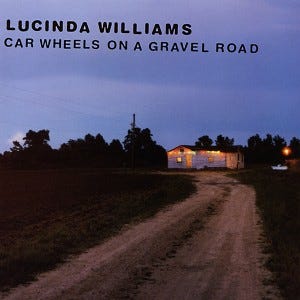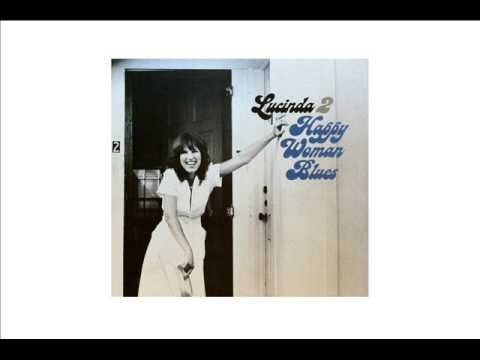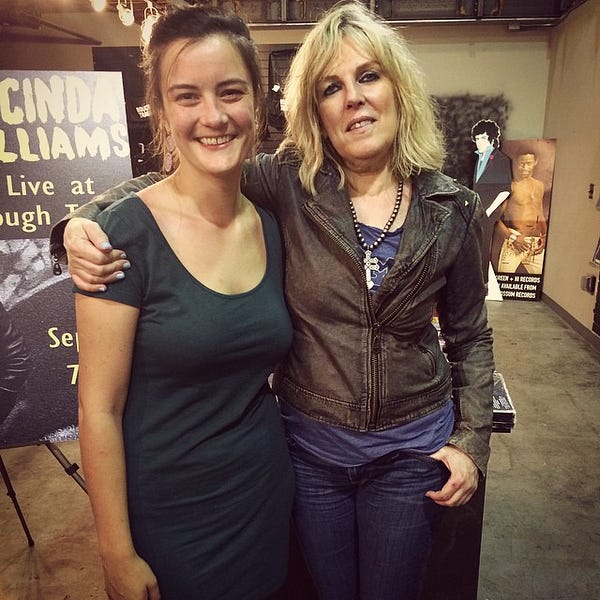Growing Older to Lucinda Williams
I spent the last weekend with my parents at my dad’s new home in the Smoky Mountains. It’s the first home he’s lived in that I’ve never lived in with him (as long as I’ve been alive, of course.) My mom’s headed down there soon once her job in D.C. is done. His new place is a marker of something slightly out of my grasp both behind and in front of me.
If you haven’t spent time in the Smokies or in a holler, I’ll tell you there’s a slice of evening when the light turns everything a deep blue and the foreground collapses onto the background like an Eric Carle collage. And within that time, there is a sudden instance where the temperature slips and you’re blanketed in a comfort you know won’t last. This light lingers for 20 minutes or so before it gets too dark, and the cicadas get too loud. That light is captured on the cover of Lucinda Williams’ fifth album Car Wheels On A Gravel Road.

But that feeling of fleeting light and time is captured on her second album, Happy Woman Blues. From start to finish, all eleven songs on Happy Woman Blues reveal a woman authentically growing into her adult self and redefining herself in romantic and platonic relationships. The eleven songs are suspended in that low blue light between leaving your first home and creating your next. It’s a roadmap for a burgeoning womanhood.
Lafayette, the opening number, plops you immediately into that purgatory. The singer has returned to her hometown and submerges herself in it’s familiarity.
We danced all night long to a sweet Cajun song
Drinkin’ and jivin’ ’til dawn, I could dance on and on
Doin’ a two-step in my sweet Lafayette
Take me back Lafayette, way down on the bayou
I’m your girl, Lafayette, I’m gonna hang around you
But we’re immediately stripped of the comfort of Lafayette by the following song, I Lost It. Presumably about a former love, the lyrics illustrate the acute pain of not only loss but the uncertainty of moving on from loss. Perhaps we wallow in grief for too long because it honors the memory of what we no longer have.

A few of the songs on the album touch on friendships that she is both weaning off of and finding a new appreciation for. Maria and Hard Road possess kind understandings of companions who’ve cut out on their own for better of worse. It’s again an exploration of extracting the fear of saying goodbye.
Maria, you’re still wild and restless
And I can just see ya ridin’ in a rodeo
You might even make it down to Texas
Or you might head out west to New Mexico
So pack up all of your belongings
A pick-up will take you where you wanna go
You can ride out when you hear mountains calling
Out to Canada or the canyons of Colorado
The great privilege I enjoy of having loving and supportive parents isn’t lost on me. And I know that in comparison, the fear of growth away from them pales to those who were given no choice in that separation. But while the timing of this limbo varies from person to person, at one point or another we all experience dissociation from the environments that once guarded us. We all find ourselves overwhelmed by the blue.
Williams’ album doesn’t just wade in transition, though. What makes it so transformational is the sense of self she starts to establish in the wake of shedding her past. In the titular song, Happy Woman Blues, she offers herself as she is, incomplete and fresh from the bruises of growing pains.
Tryin’ to find lightness in the dark
Tryin’ to live my life, tryin’ to get satisfied
My mind is in the city but my heart is in the countryside
Tryin’ hard to be a happy woman
But sometimes life just overcomes me
Everyday I’m workin’ just to pay my dues
It’s no fluke that she chose this to be song to be the linchpin of the album. In tone and lyric she charges forward while acknowledging how damn hard it can be. For me, this is Lucinda’s fight song. One that pays homage to the working women of country music like Loretta or Dolly while also keeping true to a romantic uncertainty that breaks her away from the domesticity those songwriters found themselves nestled in. Most importantly within yet despite that uncertainty, she is happy.

I had the opportunity to meet Lucinda Williams about two years ago after a concert she held in Brooklyn. I’d gone by entirely by myself which was a first. It was an evening after work and I wore a bright pink JanSport backpack, swaying in the front row, younger than most people in the audience by at least a decade. I waited in line to have her sign her latest CD, Down Where The Spirit Meets The Bone.
I’m sure many people have told her how her music has been a roadmap for them. I was just the thousandth young woman traveling down that road. I wanted to explain that Happy Woman Blues felt like a how-to guide of making it on your own and loving those you leave behind. I got to the front of the line.
“I Lost It was the first song I learned every single word to as a kid,” I thought to say as she signed my CD. She smiled and laughed and said, “As a kid? Damn, you sure know how to make a woman feel old.”
We took a photo together and while I was partially mortified I had made her feel old, it was actually exactly how, in the most wonderful way, her music made me feel as well.